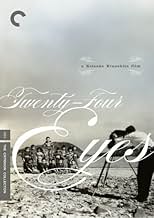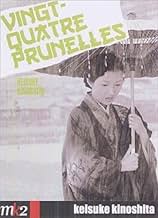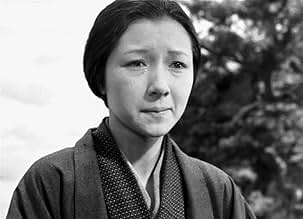Schoolteacher Hisako Oishi forms an emotional bond with her pupils and teaches them various virtues, while at the same time worrying about their future.Schoolteacher Hisako Oishi forms an emotional bond with her pupils and teaches them various virtues, while at the same time worrying about their future.Schoolteacher Hisako Oishi forms an emotional bond with her pupils and teaches them various virtues, while at the same time worrying about their future.
- Awards
- 10 wins & 1 nomination total
- Director
- Writers
- All cast & crew
- Production, box office & more at IMDbPro
Storyline
Did you know
- TriviaAccording to Japanese film critic and historian Tadao Satô, in casting this film about a schoolteacher and her relationships with her pupils over many years, director Keisuke Kinoshita very cleverly chose pairs of look-alike siblings to portray the students. So for those scenes set in later years, Kinoshita simply substituted the older siblings for the younger ones, so that the schoolchildren appeared to "grow" before the audience's eyes.
- ConnectionsReferenced in Violence at Noon (1966)
- SoundtracksAnnie Laurie
Featured review
Nearly everyone who rated this film gave it 10/10, and it's easy to see why. This is a wonderful and bittersweet story about a teacher and her first twelve students, the "24 eyes" of the title, on a fairly remote island community. The story sweeps over about 20 years, from the students in the first grade, then the sixth, then as later teenagers, then four years later. The story begins in the late 1920s, and thus spans a turbulent time in Japanese history, which of course impacts greatly on the characters, even on a fairly isolated island.
Hideko Takamine is perhaps my favourite Japanese actress. This luminous and loveable women with the dazzling smile is a joy to behold and, playing the object of much affection from the children (though only sometimes from the adults), creates a wonderful feeling. Man, I wish I'd had her as a teacher in lower primary school.
There's a strong sense of community in this story, which is one of its strong points, but it is not always a positive thing for the characters. The older women gossip, of course, about the 'modern' new teacher, because she rides a bike and wears western clothes.
The director expertly presses all the emotional buttons of the audience. There are some people who detest this sort of thing, but I'm a sucker for it. In the hands of an expert director, and for the purposes of entertainment, there's nothing wrong with being taken on a emotional roller-coaster ride. There are some high points and many sad events in the story, which moves along at a pace which is sometimes leisurely but never dull.
This film is not free of faults. Aside from the very overt emotional manipulation, there are several tunes which are vastly overused. For instance, "auld lang syne" is played at least ten times.
Also, and most surprisingly, Hideko's range is limited. Despite two and a half hours, together with Hideko being the undisputed star, she shows only three expressions during the entire proceedings. Comparison to the superb HAPPINESS FOR US ALONE shows this clearly. In HFUA, Hideko plays a deaf-mute and uses her wonderfully expressive face to full effect.
But these are minor points, and no reason to mark it down from a perfect score. This is a must-see for anyone who loves film.
Hideko Takamine is perhaps my favourite Japanese actress. This luminous and loveable women with the dazzling smile is a joy to behold and, playing the object of much affection from the children (though only sometimes from the adults), creates a wonderful feeling. Man, I wish I'd had her as a teacher in lower primary school.
There's a strong sense of community in this story, which is one of its strong points, but it is not always a positive thing for the characters. The older women gossip, of course, about the 'modern' new teacher, because she rides a bike and wears western clothes.
The director expertly presses all the emotional buttons of the audience. There are some people who detest this sort of thing, but I'm a sucker for it. In the hands of an expert director, and for the purposes of entertainment, there's nothing wrong with being taken on a emotional roller-coaster ride. There are some high points and many sad events in the story, which moves along at a pace which is sometimes leisurely but never dull.
This film is not free of faults. Aside from the very overt emotional manipulation, there are several tunes which are vastly overused. For instance, "auld lang syne" is played at least ten times.
Also, and most surprisingly, Hideko's range is limited. Despite two and a half hours, together with Hideko being the undisputed star, she shows only three expressions during the entire proceedings. Comparison to the superb HAPPINESS FOR US ALONE shows this clearly. In HFUA, Hideko plays a deaf-mute and uses her wonderfully expressive face to full effect.
But these are minor points, and no reason to mark it down from a perfect score. This is a must-see for anyone who loves film.
- sharptongue
- Jan 11, 2003
- Permalink
- How long is Twenty-Four Eyes?Powered by Alexa
Details
- Runtime2 hours 36 minutes
- Color
- Sound mix
- Aspect ratio
- 1.37 : 1
Contribute to this page
Suggest an edit or add missing content























